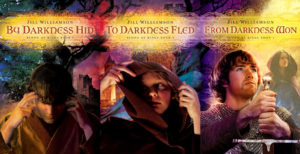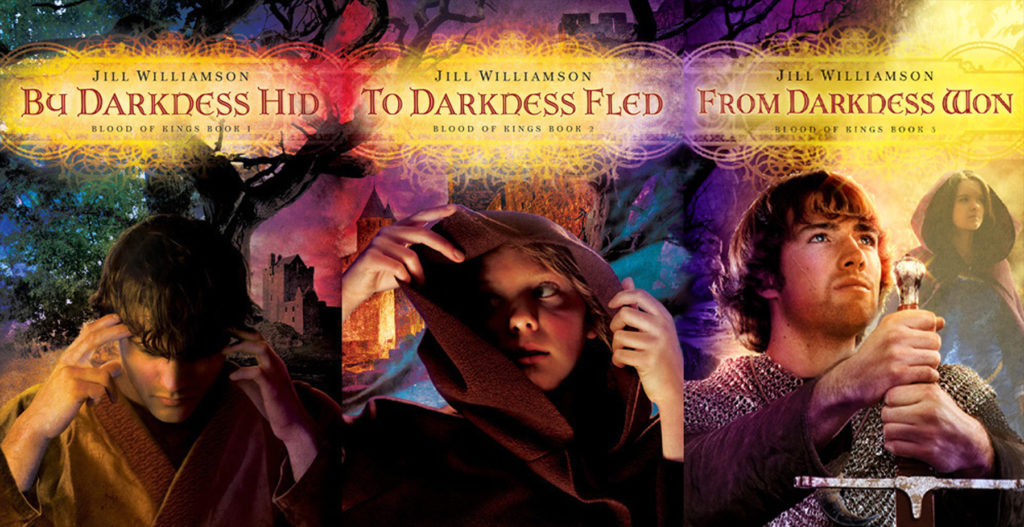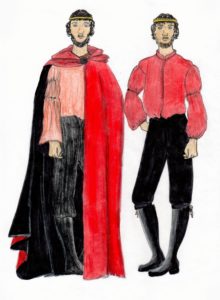Jill Williamson on Writing, ‘Darkness’ and Light In Fiction, Part 2
Intro: again this interview is available on audio, by downloading episode 2 (right-click and select “Save As”) of Speculative Faith’s new podcast, The Portal. You can also listen to Part 1 of that audio interview, or read the transcript.
[audio:http://www.speculativefaith.lorehaven.com/theportalpodcast/JillWilliamson_part2_SF_04.22.2011.mp3]
 Mostly it’s been difficult to break down [categories of] Christian, non-Christian; speculative, non-speculative; youth, non-youth. This one simplifies it a bit, because another one of the debates is: “hey, all this or most of this Christian fantasy and sci-fi that is out there is really YA-oriented.” And I’ve heard a few people ask, “Where are the God-honoring fantasy/sci-fi novels for adults?”
Mostly it’s been difficult to break down [categories of] Christian, non-Christian; speculative, non-speculative; youth, non-youth. This one simplifies it a bit, because another one of the debates is: “hey, all this or most of this Christian fantasy and sci-fi that is out there is really YA-oriented.” And I’ve heard a few people ask, “Where are the God-honoring fantasy/sci-fi novels for adults?”
Do we even have a market for those yet, or should we maybe agree with Jeff Gerke, who at least said in one interview: Hey, I think the market for that is growing up right now. We’ve got all these home-schoolers, we’ve got all these Christian young people who are going to grow up, and they’re not going to want novels about buggies and bonnets and prairie romances — they want the sci-fi fantasy weird stuff!
I think that that’s true, that when those people grow up that the market will be bigger because of that. I think that the market’s there — it’s just hard to find it. And I think perhaps it will be easier, once people figure out — once publishers figure out how to market it, especially now with Christian bookstores not doing so well, they’re having to think of new ways to reach their audience. And if they can figure that out, then the audience [members] are going to find the books they want. That will be interesting to see how that works out.
Speculative, for adults, does really well, but not necessarily the fantasy and outer-space genres. Like if you do a thriller, with a speculative twist, that tends to do well. I don’t know what publisher would say if they’re looking for that kind of thing, but people read it when they can get their hands on it. And I know David C. Cook publishes several authors who do that, and Thomas Nelson does, with Ted Dekker and Robert Liparulo. And Travis Thrasher always does something strange in his books, doesn’t he? …
People do want it. Publishers just don’t know how to package it and get it to the right people. Because they don’t want to buy something that they don’t know how to sell, because then they lose money and the author ends up failing in a way, because they feel like they didn’t sell as many as they should have.
What do you think of the Marcher Lord model? With e-publishing and the way that they have it set up? Is that the future, in your view, or close to the future?
I’m not sure. I think that it’s really a good thing. But I get emails all the time from people telling me they’re going to the bookstore and going to buy my book. And I have to tell them: ‘No you can’t; it won’t be there.’ So there are people who really just want to buy the book — they just want to go to a store, buy the book. And they’re never going to find a Marcher Lord Press book in a bookstore; that’s not the way the publishing model is set up.
That doesn’t mean Marcher Lord Press isn’t successful in what it’s doing — it’s doing exactly what it’s supposed to be doing. But there’s publishers out there, like the bigger publishers, who’ve always done the bookstore thing. Their books will get in the bookstores.
So if they can come up with a combination of Marcher Lord Press-slash-a big publisher, and they can figure out how to use the technology so that they don’t have to warehouse so many books … it saves money to print up a bunch in advance, but then you have returns. … They’re all figuring out how they’re going to use the new technology to save money all around and get books where people want to buy them, whether that’s online or in a store.
Here’s a related question, relating to the economy. I wondering, because I’ve seen conflicting statements about what happens to the speculative book market when the economy is rough. One source I [saw] said more people are looking for ways to escape their rough lives in real life, so they go read a speculative book. Then someone else says that no, books are difficult to sell even a good economy, so it’s not going to work in a rough economy. What have you seen?
Well my book has only been available when the economy’s been kind of rough. I think all my books have been. I think people buy books! People who like to read — who really like to read — keep buying books because the like them. And the Kindles and the Nooks of the world — whereas I don’t use mine to read for entertainment as much as the many people do — many people do use them to read for entertainment and the books are less money on there. So they can afford to buy more. And some people are just tree book-shoppers. I have a couple of friends who subscribe to FamilyFiction.com, which has a section at the bottom that says whatever books are free that month, and they just stock up and they read whatever’s free. Interesting plan! People are finding ways to read what they want to read.
And the Kindle — you can loan books to your friends for a certain amount of time. … People are especially buying Kindle books. I’ve sold more Kindle books than I’ve sold paper copies of my books. Quite a bit more, I don’t know — I would say like sixty-forty, maybe.
See, I don’t have a Kindle. At this point I’m still in that primitive mood of only wanting to get the tree books, as you called them. …
I was very surprised to see them do that well; I had no idea there were that many Kindles out there.
So maybe the future is in e-publishing.
Now, Blood of Kings is finished, right? That’s the end of the trilogy?
Yes, it’s all done.
What other books are ahead, including this one that you’ve sold to ZonderKidz?
The one I sold to ZonderKidz is a young-adult science fiction suspense. And I called it Jason Farms, but I think they’re changing the name to Replication, to make it sound more sci-fi and not about a farmer, I guess! … That’s a book about a girl whose dad moves her to Alaska, and he’s a scientist, and he’s taking a job there. And she snoops around and finds that he’s working at a cloning lab, and that they’ve cloned the high-school jock. And she makes friends with one of the clones, and she actually had already made friends with the jock boy. So she’s going to try to help them. That’s what that’s about. And it was a fun story.
I wrote that story before I wrote By Darkness Hid. I had that one sitting around. That’s supposed to come out in January of 2012. That one was already written, so I didn’t have to do anything for that. I just have to wait to edit it.
How did you end up selling By Darkness Hid before this one?
I don’t think I pitched Jason Farms to anyone. I didn’t pitch By Darkness Hid to anyone either. I met [Jeff] at Mt. Hermon’s conference in 2007 … and I paid him to do an editorial review on my New Recruits spy kid story, because I thought there was something wrong with it and I couldn’t figure it out. So I wanted someone to read the whole thing and give me some feedback. … And when I went to the Oregon Christian Writers’ conference in 2008, there was — as usual, for those of us who write young-adult fiction, especially young-adult speculative — there was nobody — no publishers or agents wanted to see young-adult anything. That’s always frustrating, when you go to a conference, and you save money, and then it’s like “Nobody here wants to look at what I wrote!” So that was the case that year.
Jeff was there, and I thought, well, at that conference you get to put in three proposals in advance, without having to try to chase down an editor and make a pitch in an elevator or something. … I wanted to take advantage of that. So I gave my first chapter of By Darkness Hid, which was called Bloodvoices at the time, to Jeff, to see what he thought of it, because I thought he was really wise about editing and story. … He wanted to see me, and he asked me why it had to be young-adult. And I said, “I don’t know! ‘Cause they’re sixteen and seventeen years old?” And he’s like, ‘Eh, it’s medieval! It works.” … He asked me if it was done, and I said yeah, and so he wanted to see the full. And a couple of months later he wanted to buy it. … I had no intention of actually trying to sell it to him. But it works out that way.
I wondered, because on Marcher Lord’s submission site, they say, We’re not looking for YA. And yet here’s By Darkness Hid, which is not YA according to Jeff, but does really well with the YA demographics.
I can continue calling it young adult! I tried to sit down and think, “Could I write an adult book?” And maybe I could. But I don’t want to. That’s not what I feel called to do. So I just want to keep writing more books for teens.
With the ZonderKids book — I sent more ideas over to them, and they’re thinking about stuff. We’ll see. I’m trying to get a feel on what they might want to see next so that I decide which idea to write next.

Many fans enjoy helping promote the "Blood of Kings" novels.
I’m concerned about it a little bit. My agent seems to think that as long as I stay speculative I’ll be fine. But I might be trying to think up another fantasy novel soon, so that I can have another one out, just because I have people. And I like it! So we’ll see.
But the other ideas I have right now are just all over the place. The Jason Farms is sci-fi, but I have a dystopian one and I have a time-travel one. I guess anything goes when you write speculative, right?
Yes. But are you going to be writing any novels with forlorn-looking Amish women on the front of them?
Probably not! Unless she time-travels or something. No, I don’t have any plans to do that. I’ll stay speculative.
… I’ll just throw that out for you to take on, if you want to, because I certainly want no part of it — the time-traveling Amish. Throw in some androids or whatever. Tim Challies, the Christian blogger — he once came up with an Amish vampire end-times novel concept. [Editor’s note: but months after this.] I thought: actually, dude, that could work.
They would know how to survive!
That’s true! Thrown right back in time. They’d be familiar with that lifestyle.
Do you have a favorite sub-genre within the speculative genre? It sounds like you’re just open to a lot of them, so long as it’s speculative.
I don’t know if I have a favorite. I don’t think I do. … As long as it’s speculative — I like to have weird things, and obviously young-adult would be my favorite.
You think you’re going to keep writing for young adults, or ever try to branch out beyond that?
I have no plans to branch out beyond that right now. I’m going to keep going. And I find that a lot of adults like to read young-adult, maybe not in the Christian market as much as in the general market, but you find a lot of people who like to read teen books in the general market. … I might keep some of my adult readers, for a while, anyway.
Earlier, you mentioned that you feel like your calling is to write these kinds of books for teens or young-adults, even if they have broader appeal for older readers. I’m curious if you want to discuss more of what you believe your calling is, and how God has been working through your books.
Like you said, I feel like God has called me right now to write stories. And I didn’t know that’s what His plan was going to be. I had wanted to be a fashion designer, and then when I was done with that, I thought, maybe He wants me to use my story to speak to kids and be a motivational speaker or something because I grew up in Alaska and I have some interesting experiences. … And as I started to research how to get started as a speaker, writing articles is one way, and I started writing articles, and accidentally started writing that fiction book, and it was way more fun! And I did struggle with that for a while. But I feel like God’s kind of shaped me for this — because my entire life, growing up in Alaska, I’m cursed with an overactive imagination. I feel like now I finally found a use for this overactive imagination! It works really well as a storyteller to be able to use that imagination for something productive rather than just sitting around and coming up with bizarre scenarios in my head.
There are a lot of people, and I might be one of them, who also feel cursed with an overactive imagination, but aren’t ever — just because God has other things in mind — aren’t ever going to get published. … He has other callings for them, involving that imagination or not. What encouragement might you have for people like that, who think yeah, maybe, kinda sort of might want to get published someday, but ultimately won’t end up being published, yet are just as awesome and can be used by God in other ways?
Oh, there’s lots of ways to use an overactive imagination … just even working with kids. People who have an overactive imagination really relate well to kids of all ages, because kids tend to be closer to that imagination. … You could just sit there and start talking to them, and totally suck kids into your story or whatever you’re saying, if you’re talking to them on their level.
God calls us not just to specific things like writing. Overall He calls us to have relationships with people. If you can use your imagination to inspire others, or to even build friendships, who knows what you could do? I think that God wants us to care about other people, and people with overactive imaginations can do that, even though sometimes we like to be by ourselves! And maybe it’s just me. … Leave the room and actually meet people, and you’ll find that people like you and they like your overactive imagination. I call it being random.
I’m thinking of my wife, who used to write more stories and things like that, really enjoys speculative literature — including yours — but doesn’t do a lot of writing now, but she still has that imagination. I see how she gets along very well with children, just because she can, like you said, get down on their level and go, Oh really, yeah? Well how about that.
How many kids do you have? I meant to ask that earlier, actually.
I have two. My boy is nine and my girl is seven.
And — they’re madly in love with your books?
Well Luke is. Luke is the nine-year-old. He loves to read. Caitlyn likes to read too, but she doesn’t have the attention span to sit there and listen. She’s just different that way.
Luke is totally sucked in. In fact, I only read him half of book three because I was reading it to him out loud as a way to proofread, but I was going too slow, and I had to drop him out of the process, because it takes longer to read it out loud and plus it takes longer to find times where he’s with me where I can read it! So he keeps asking me to finish it.
What’s it like for your kids, having the Jill Williamson as their mother?
Oh, I think it annoys them, maybe, more than anything. Luke thinks it’s kind of neat; he likes my books. They both a little poster in their room — little postcard-sized things. Luke has book one, and Caitlyn has book 2, because Vrell’s a girl. But … Mommy’s always on the computer — is one of the things they’d probably prefer [not having]. … Last week, my husband’s actually been out of town, and so it’s been me and the kids, and my book was turned in, and so I was able to play with them a lot more this last week. … I finally got done with it! … I actually got out on the trampoline … and jumped with them. … It’s an antique one. I’m sure somebody’s going to get injured. Luke’s getting braver — he can do flips now.
This is one of those speculative fiction things — we like things that are a little bit dangerous, a little bit riskier.
… How often do you try to write per day? Do you have a word count you try to reach when you’re in the middle of a project? For those listeners or readers who want to know, what are your secrets to sticking with a project?
When I’m working on actually writing that first draft, I do try to have a word count per day, and usually, crazy person that I am, will try to figure out what my overall word count goal is, and then do the math and figure out how many days I have and how many words I need to do per day. Then I try to shoot for that goal. So if I have more time, I won’t write as much — unless I get going. It’s always good to get ahead of yourself when you’re trying to get that first draft done. I’ll shoot for how long it’s supposed to be.
Now with my new books — Jason Farms is only about 90,000 words. I can really, truly write regular-length books! I don’t have to just write 360,000-word Marcher Lord Press books.
What was the word count for From Darkness Won?
160 or 158 [thousand], something like that.
It was actually maybe 20 pages shorter than book two. I thought that was a victory.
When you had a Tweet that said that To Darkness Fled was 160-something thousand words, I rejoiced. … I have it in my head that if you write above 100,000 words, that’s it, you’re shot, your chances are gone. But I haven’t been able to write anything that’s less than that and do integrity to what I think is the story. So that’s an encouragement to me, just personally.
That’ll be tough to try to sell to most publishers. They’re kind of anti- the big books. But Jeff is not so. That’s something that’s really cool about Marcher Lord Press is he didn’t care how long it was. The first [draft of] By Darkness Hid was only about 95,000 words when I pitched it to him, and it got longer with his edits and asking for me to add more description and things like that. … He kept saying, Oh, it doesn’t matter. We can do what we want here.
That does sound like a dream. And yet you’re going with ZonderKids now. Will you keep writing for Marcher Lord, or do you think a traditional publisher, for those who do want to go into the bricks-and-mortar store and get a tree book, is the way that you’re headed inevitably?
I’m not opposed to writing more with Marcher Lord Press. Jeff and I were actually talking about what I might write, so I’m supposed to be thinking about whatever that might be. We’re discussing that and we’ll see how that works. Maybe I’ll keep writing fantasy! Woo-hoo! … But I am going to be, hopefully, writing books with ZonderKidz too.
Well, I’m sure I’m not the only one who looks forward to seeing what’s ahead for you. And your being on the ground floor of Marcher Lord has been a blessing to all of us who’ve read and enjoyed the Blood of Kings trilogy. I say that like I don’t know it, but sometimes I have to remember: it’s By Darkness Hid, To Darkness Fled and From Darkness Won.
I think I am out of questions. Unless you can think of anything else to close with — maybe you want to say something that I didn’t think to ask you about — do feel free. But otherwise I can let you go, get back to writing or taking care of the children or whatever your calling is this afternoon.
I don’t think I have anything else to say. Thank you for having me!
Absolutely. My guess is I’ll end up splitting this into a two- or three-part interview. And if you like I can send you the links so you can keep track of any discussion or feedback from readers. And hey, I appreciate getting to talk with you again. … How long has it been since that conference? Six, seven months?
Are you going to go this fall?
I’m going to try. Of course, the economy being rough and we’re all so morose and everything — it may be difficult, especially since it’s further away from me. But I’m going to try, because I’ve definitely been doing more this past year than I have before. … Maybe I’ll see you there. … I think they get more and more encouraging every year. Although you’re like the only author-slash-editor listed on the ACFW page who does not say: No fantasy, no sci-fi, no nothing, no paranormal, no end-times, no supernatural thrillers, nothin’.
We need to get more people willing to critique, huh?
Well, maybe. [Or] you could stay unique.
I’m fine being unique!
I’m sure that’s the case either way.
Well, I will let you sign off, and again, thank you so much.
Okay, thank you!
Talk to you later.










































[…] Jill Williamson on writing, ‘Darkness’ and light in fiction, part 1 Friday, April 15th, 2011 by E. Stephen Burnett Introduction: today Speculative Faith begins expanding to other media with The Portal podcast. Download the audio edition of this interview (right-click and select “Save As …”). Part 2 will be available Friday, April 22. […]
Great interview. Thanks!
Jill, I didn’t know you grew up in Alaska? Where did you live? I used to live there. In Wasilla most of the time. I know what you mean about it feeding the imagination. I used to go sit up at Hatcher’s Pass, before they turned it into a tourist place with the museum and the bathrooms and the paved road, and I felt like characters were hidden in the mines calling to me, wanting me to tell their stories. Or I’d sit on the shore of one of the lakes up there and just listen to the wilderness. It always felt so mysterious.
OK, that does it. Now I’m going to have read your books.